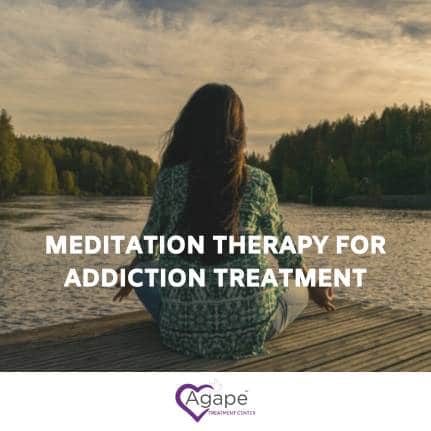
Meditation therapy involves using different types of meditation to reduce anxiety and stress. Since the effects of meditation are huge, it is a widely accepted and encouraged aspect of many addiction treatment programs. The primary purpose of meditation is to bring the mind, body, and spirit into total synchronicity to help improve overall wellbeing and increase one’s quality of life. There are many different techniques used for this practice, but most focus on the breath and increasing one’s awareness.
Table of Contents
ToggleWhat is Meditation?
Meditation involves a set of techniques that are practiced to encourage focus, awareness, and connection. It is often used for religious purposes among nearly every religious group, but many people also practice it independently. There are many different types of meditation and it can take on different forms, but almost all carry their own benefits. Due to the benefits of meditation therapy, it is often used as a psychotherapeutic technique for mental health, addiction treatment, trauma-informed care, and more.
The two primary categories of meditation are mindfulness and concentrative. First, mindfulness meditation uses mindfulness-based cognitive therapy (MBCT) and mindfulness-based stress reduction (MBSR). Mindfulness focuses on targeting a variety of issues like substance abuse and depression. Although each person may practice it differently, it involves becoming aware of and participating in the present moment. This practice is known to help make people more accepting, openminded, and aware of physical, mental, and spiritual sensations.
Concentrative meditation, on the other hand, involves putting all of your attention and focus on a specific object, sound, or mantra. At the same time, participants try to tune out the rest of their surroundings. During the meditation, people may focus on their breath, a repetitive word or phrase, a physical object in the room, and more. This focus is said to help people reach a higher state of being and consciousness.[1]
Benefits of Meditation
Meditation therapy provides addiction treatment patients with a vast list of benefits, including:
- Lower stress levels
- Reduced anxiety and depression
- Better, more stable mood
- Improved PTSD and ADHD
- Enhanced creativity, attention, brain activity, focus, and academic performance
- Better sleep quality
- Management of withdrawal symptoms
- Coping with cravings
- Reduced risk of relapse and return to treatment
Meditation therapy works by changing brainwaves and decreasing cortisol production – the chemical responsible for stress regulation. Furthermore, this enhances cognitive performance and helps regulate planning, thinking, and problem-solving. Meditation is also known to reduce fear, responses of fear, and motor control.[2]
“Although a seemingly simple technique, mindfulness operates on several key levels. It allows us to notice cravings before they take hold. It strengthens our “muscles of attention”, making it easier to let go of addictive thoughts. It makes us better equipped to experience cravings without having to react to them. And it enhances our ability to cope with stress, which means we’re less likely to turn to pleasure as a crutch in the first place.”
How Meditation Therapy is used in Addiction Treatment
Meditation therapy helps patients in addiction treatment to achieve a sense of calm, peace, and balance. All of these things benefit one’s overall health and emotional well-being. Although the effects of meditation begin while one is practicing it, they can help you carry peace and calm with you throughout the day.
Obviously, having a regulated and balanced mood helps support recovery. After all, certain negative emotions, like stress, anger, anxiety, and more can provoke a relapse or thoughts of using. Fortunately, meditation therapy used in addiction treatment can help alleviate these emotions. In addition, if one of these unpleasant emotions does come up, individuals can meditate to cope – making meditation therapy an important asset of addiction treatment. It provides patients with a skill that allows them to pause, breathe, and reflect on their thoughts before taking a destructive action.
While better decision making and coping skills are important aspects of addiction recovery, meditation therapy also helps mitigate withdrawal symptoms. Symptoms such as depression, anxiety, restlessness, and insomnia are all common withdrawal symptoms that meditation therapy can help reduce. As a result, meditation therapy used in addiction treatment programs is a helpful tool to relieve withdrawal symptoms and ease the mind during detox.
Discover the Benefits of Meditation Therapy in Fort Lauderdale
Meditation therapy is widely available at many addiction treatment centers in Fort Lauderdale. Individuals who are looking for a transformative and peaceful journey of recovery are encouraged to give meditation a shot. Many facilities will do group meditations, individual meditations, and even yoga and meditation in combination. While meditation therapy isn’t a standalone treatment for drug or alcohol addiction, it is significantly useful when used as a part of a comprehensive addiction treatment program.
If you or a loved one is looking to change your life and put down the substances for good – contact our addiction specialists in Fort Lauderdale today.
References:






